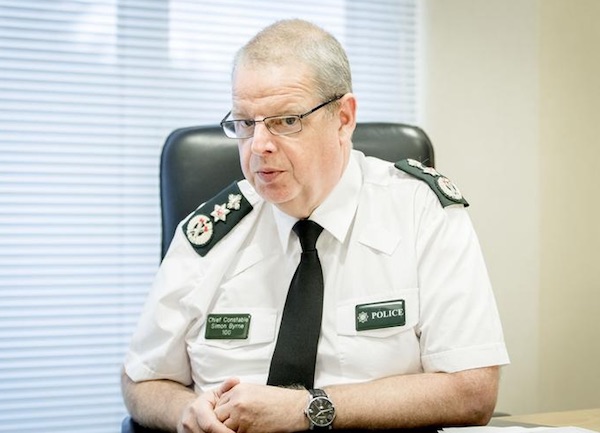
The PSNI chief has said he is in the dark about plans for a new police unit to deal with investigations into unresolved cases from the past conflict, despite a looming deadline for its formation.
Legislation to enact commitments made in the 2014 Stormont House Agreement for an independent Historical Investigations Unit (HIU) was promised by the British government in January as part the ‘New Decade, New Approach’ deal. A 100 day time period, now half over, was set out for its completion.
PSNI Chief Simon Byrne (pictured) said after a meeting on Thursday he still had no new information about it.
“We hadn’t seen formally yet any detail about what might happen in the space of setting up something akin to an historical investigation unit,” he said.
But he also warned there could be new delays to follow the current one. “I think we have to be realistic, this isn’t going to happen overnight, so we have to manage current investigations as well as the transition to a new body and answer questions about who is going to lead it, how it will work, where it will be based, and what’s the breadth in terms of reference to see what sorts of inquiries it will undertake,” he said.
Fears of further time-wasting by the authorities came as it emerged that former British soldier Denis Hutchings, facing charges connected to the 1974 murder of John Pat Cunningham, will be postponed due to new concerns over his health.
John Pat Cunningham, who had special needs, was shot in the back and killed as he ran away from a British Army patrol near Benburb, County Tyrone, in 1974.
Hutchings’ trial was due to begin on Monday. The adjournment was blamed on a chest infection and concerns about being susceptible to contracting coronavirus.
There are signs of other excuses being used to delay and deny justice for the victims of state killings.
Patrick McVeigh (44) was shot dead in May 1972 in southwest Belfast after he stopped to chat to a group of civilians manning a checkpoint in the area. He is thought to have been a victim of the British Army’s paramilitary-style ‘Military Reaction Force’ (MRF).
His daughter has now been told by police that they cannot question a suspect because he has taken ill.
Mr McVeigh’s daughter Patricia has campaigned for justice for her father for five decades. She said that police have told her they have yet to interview a former MRF member who lives in Australia.
“I was told that they have not been able to question (the former soldier) as yet because he took ill,” she said. “It’s a great pity they did not get the interview done while he was fit”.
![[Irish Republican News]](https://republican-news.org/graphics/title_gifs/rn.gif)
![[Irish Republican News]](https://republican-news.org/graphics/title_gifs/harp.gif)

